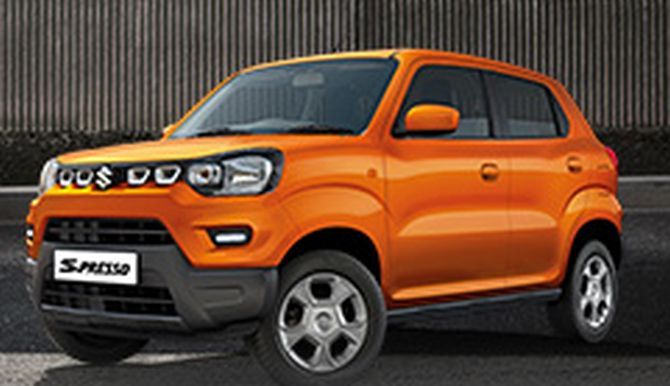The growth in the PV segment was primarily led by car market leader, Maruti Suzuki India, which saw its dispatches to dealers grow 4.4 per cent YoY to 144,277 units after 10 months of drop.
It was driven by new launches, such as the S-Presso, a mini sport UV.

Attractive consumer offers in the festive season, coupled with brisk growth in utility vehicles (UVs), drove passenger vehicle (PV) sales in India into positive terrain after 11 months of persistent decline, Society of Indian Automobile Manufacturers (Siam) said on Monday.
Automakers in India count dispatches to dealers as sales. However, dragged down by two-wheelers and commercial vehicles, the overall dispatches (all categories) during the month saw a year-on-year (YoY) drop of 12.76 per cent.
Siam expects November and December to show growth over last year.
Automakers in India dispatched 285,027 units of PVs, against 284,223 units a year ago.
New model launches in the UV segment drove volume growth to a seven-month high.
Sales of such vehicles rose to 100,725 units, against 82,413 units last year.
A low base of last year also aided overall growth in the PV segment.
However, volumes are not strictly comparable.
Unlike last year, most festivals this year were bunched up in a single month.
The growth in the PV segment was primarily led by car market leader, Maruti Suzuki India, which saw its dispatches to dealers grow 4.4 per cent YoY to 144,277 units after 10 months of drop.
It was driven by new launches, such as the S-Presso, a mini sport UV.
Analysts remain cautious in their outlook.
“Even as the relative YoY volumes may look better in the next few months as the base effect catches on, we expect absolute volumes to remain under pressure after reduction in consumer offers and end-of-the-festive season,” said Mitul Shah, vice-president, research at Reliance Securities.
Sales for the rest of the automakers remained negative, even as stock pile-up reduced substantially on the back of heavy discounts.
In PVs, the unsold stock at most of the companies have reduced to less than a month, Rajan Wadhera, president, Siam, told reporters in Delhi on Monday, adding Siam expects the momentum in the current and following month to continue.
“It will be on a lower base of last year, measures taken by the government, and new launches,” Wadhera added.
He expressed concern over the sales performance of the medium and heavy commercial vehicles in the goods segment.
“The heavy commercial vehicles are in serious trouble. It shadows the economy,” said Wadhera, adding, there is a lot more to the steep decline than inventory correction.
International rating agency Moody’s Investors Service changed its outlook for India from ‘stable’ to ‘negative’ last week.
The change, it added, “partly reflected the government and policy ineffectiveness in addressing economic weakness, which, in turn, led to an increase in debt burden from already high levels for its action”.
Sales of trucks with a gross vehicle weight of 16 tonne and above fell sharply by 54.97 per cent to 12,797 units over a year ago, as reduced economic activity and an idling fleet of trucks forced transporters to put off purchases.
Wadhera also attributed the sharp fall to the “structured interventions”, such as the new axle norms that allow trucks to load 35 per cent more.
There are efforts to improve the economy; hopefully it should work,” he said, alluding to the recent measures announced by the finance minister for the real estate sector.
Meanwhile, two-wheelers sales also continued to hurtle down as manufacturers remained cautious of the ballooning inventory and curtailed dispatches to dealers.
Led by motorcycles, which skidded 16 per cent over the same month, the overall sales in the segment dropped 14.43 per cent YoY.
Sales of scooters and mopeds, too, dropped 10 per cent and 27 per cent, respectively.
Wadhera attributed it to disruptions in rural India on account of an extended monsoon, floods, etc.
He expects the segment to revive in the current month, as rural households get cash in their hand after the recent harvest.












 © 2025
© 2025